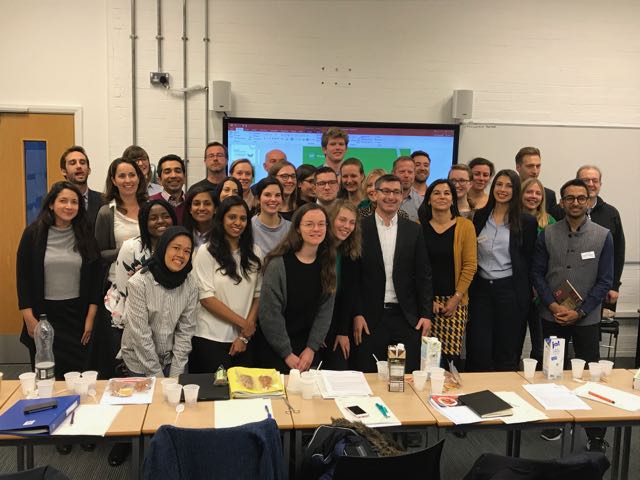Cooking up fresh business ideas from retail food waste
26 November 2018

Student competition sees supermarket waste bread, banana, and potato turned into business opportunities
Students from EU universities have competed to pitch their ideas on how supermarkets can turn wasted food into fresh ‘dough’.
The Circular Food Generator Track saw student teams from three institutions, including the University of Reading, participate to develop ideas for retail businesses to reuse food. The competition was hosted by the University of Reading as part of the EIT network, and included ways to reuse bread, bananas and potatoes that would otherwise be going to waste.
The three student teams presented their products to a panel of industry experts on 26 November. The jury, consisting of representative for each of the industrial partners and a representative from EIT Business Creation department, decided the BanaBooms team from the University of Honeheim was the winner. They will receive a cash price (€1,000) and the possibility to apply for funding to further develop the product.
Dr Paola Tosi, the lead academic from the University of Reading supporting the project, said: “We’re excited that the University of Reading is taking part in this project, and our involvement has helped to highlight the strength of Reading’s role as a leader in food education. The project itself shows how future leaders in the food industry can help to think beyond the ‘bottom line’ of business and recognise the need for sustainability and corporate social responsibility.
“The project has been a great opportunity for the students involved to work on a real issue. The opportunity to develop solutions that may lead to financial and sustainability benefits is a real plus for their future careers, and support from industry has been a key aspect that has made the experience especially valuable”
The University of Reading was one of three Universities taking part in the competition. Each institution recruited six postgraduate students to form a multidisciplinary team, and received support from industrial partners in the form of coaching as well as guidance on the design and development of new food products or business models from the selected food waste products.
The Reading team focused on potatoes nearing their sell by date, which are currently destined to be removed from supermarket shelves to be disposed of as waste. The team has developed a croquette-type product called 'Potato Globe', which would be available in three different fillings: Mediterranean, South East Asian and West-African. The idea was inspired by the diverse backgrounds of the students involved.
The team in University of Leuvan developed a banana bread recipe to be sold in the form of snack bars while the University of Honeheim worked on producing banana-based breakfast flakes.
Further information:
The challenge runs alongside the 2017-18 academic year and features potatoes, banana and bread waste streams. The leading partner, Colruyt Group, selected these food items as they make up a significant portion of food waste from the European retail sector.
The student team have been supported by an academic team champion, and were funded to visit industrial partners Colruyt Group’s and Puratos’ headquarters in Belgium to learn from experts in retail, food industry and marketing. The student teams also attended a two day workshop in Germany, hosted by DIL ( German Institute of food research), during which they had access to food pilot plant facilities to start developing the product, and also learned about consumer behaviour through lectures by representatives from EUFIC (European Food Information Council), which is also a partner in the project.
The competition is sponsored by the European Institute of Innovation and Technology (EIT) and supported by industrial partners from Belgium and Germany.
Colruyt Group are already undertaking initiatives to reduce our waste, and more information is available on:
